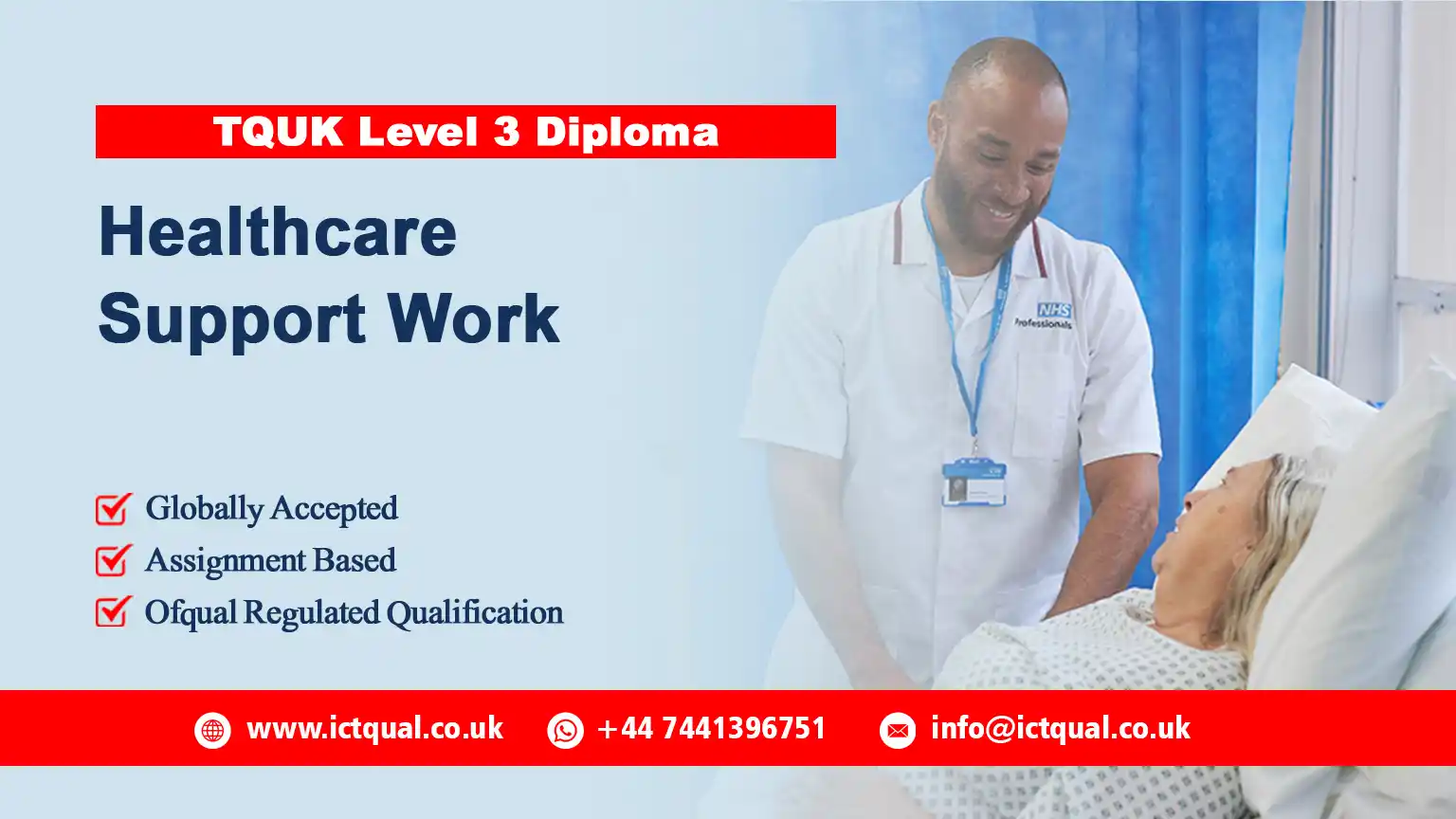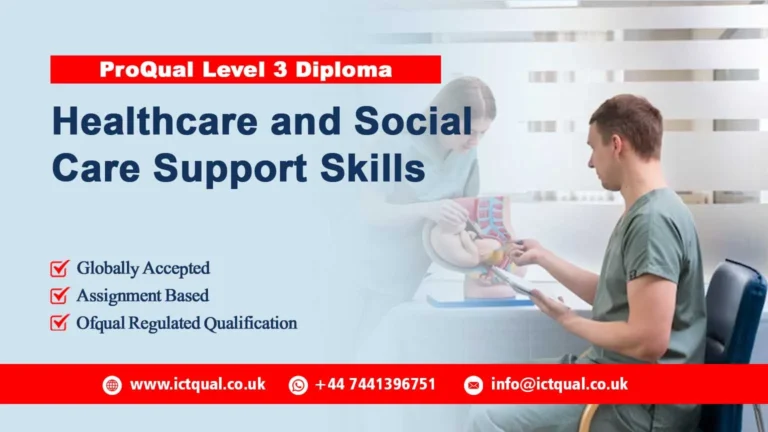| A. Optional Units | |
| 1 | Adapt and fit healthcare equipment, medical devices, assistive technology, or products to meet individuals needs | 6 |
| 2 | Administer medication to individuals and monitor the effects | 5 |
| 3 | Administer oral nutritional products to individuals | 4 |
| 4 | Advise and inform individuals on managing their condition | 5 |
| 5 | Anatomy and physiology for maternity support workers | 2 |
| 6 | Assist in and monitor the administration of oxygen | 4 |
| 7 | Assist in implementing treatment programmes for individuals with severely reduced movement mobility | 4 |
| 8 | Assist in receiving, handling, and dispatching clinical specimens | 2 |
| 9 | Assist in testing individuals’ abilities prior to planning physical activities | 5 |
| 10 | Assist in the administration and management of medication | 3 |
| 11 | Assist in the delivery of perioperative care and support of individuals | 4 |
| 12 | Assist in the implementation of programmes to increase mobility, movement, and functional independence | 4 |
| 13 | Assist others to plan presentations | 2 |
| 14 | Assist practitioners in carrying out health care activities | 3 |
| 15 | Awareness of mental health legislation | 3 |
| 16 | Build positive relationships with children and young people | 3 |
| 17 | Care for a newborn baby | 4 |
| 18 | Care for individuals with urethral catheters | 4 |
| 19 | Care for the older person | 2 |
| 20 | Caring for the physical and nutritional needs of babies and young children | 5 |
| 21 | Carry out blood collection from fixed or central lines | 4 |
| 22 | Carry out vision screening | 4 |
| 23 | Carry out wound drainage care | 4 |
| 24 | Collaborate in the assessment of environmental and social support in the community | 4 |
| 25 | Conduct intravenous cannulation | 6 |
| 26 | Conduct routine maintenance on clinical equipment | 4 |
| 27 | Conducting hearing assessments | 4 |
| 28 | Contribute to the care of a deceased person | 3 |
| 29 | Contribute to the safe use of medical devices in the perioperative environment | 4 |
| 30 | Coordinate individuals through care pathways | 3 |
| 31 | Deliver exercise sessions to improve individuals’ health and wellbeing | 5 |
| 32 | Deliver training through demonstration and instruction | 3 |
| 33 | Dementia Awareness | 2 |
| 34 | Develop and agree individualised care plans for babies and families | 5 |
| 35 | Effective communication with children and young people in care settings | 4 |
| 36 | Enable children and young people to understand their health and well-being | 5 |
| 37 | Enable individuals with behaviours that challenge to develop strategies to manage their behaviour | 8 |
| 38 | Give presentations to groups | 4 |
| 39 | Identify, collate and communicate health information to individuals | 2 |
| 40 | Implement hydrotherapy programmes for individuals and groups | 5 |
| 41 | Implement therapeutic group activities | 4 |
| 42 | Implement therapeutic group activities | 4 |
| 43 | Manage the use of physical resources in a health setting | 3 |
| 44 | Managing symptoms in end-of-life care | 4 |
| 45 | Measure and record individuals’ body fluid balance in a perioperative environment | 4 |
| 46 | Monitor and maintain the environment and resources during and after health care activities | 3 |
| 47 | Monitor individuals progress in relation to managing their body weight and nutrition | 3 |
| 48 | Move and position individuals ‘safely’ in accordance with their care plan | 4 |
| 49 | Notify an individual of discharge arrangements | 2 |
| 50 | Obtain a client history | 3 |
| 51 | Obtain and test capillary blood samples | 4 |
| 52 | Obtain venous blood samples | 3 |
| 53 | Perform first-line calibration on clinical equipment ensuring it is fit for use | 3 |
| 54 | Perform routine electrocardiograph (ECG) procedures | 4 |
| 55 | Prepare and apply dressings and drains to individuals in the perioperative environment | 2 |
| 56 | Prepare and dress for scrubbed clinical roles | 4 |
| 57 | Prepare and provide surgical instrumentation and supplementary items for the surgical team | 6 |
| 58 | Prepare and support individuals for healthcare activities | 3 |
| 59 | Prepare for, obtain and test specimens from individuals | 3 |
| 60 | Prepare the anaesthetic environment and provide support for pre and post operative anaesthesia and recovery | 5 |
| 61 | Prepare, insert and secure nasogastric tubes | 4 |
| 62 | Principles of health promotion | 2 |
| 63 | Provide advice and information to enable parents to promote the health and well-being of their newborn babies | 3 |
| 64 | Provide advice on foot care for individuals with diabetes | 4 |
| 65 | Provide agreed support for foot care | 3 |
| 66 | Provide information and advice to individuals on eating to maintain optimum nutritional status | 5 |
| 67 | Provide support for individuals with interaction and communication difficulties | 4 |
| 68 | Provide support for mobility | 2 |
| 69 | Provide support to individuals to continue recommended therapies | 3 |
| 70 | Receive and handle clinical specimens within the sterile field | 4 |
| 71 | Recognise indications of substance misuse and refer individuals to specialists | 4 |
| 72 | Remove wound closure materials | 3 |
| 73 | Remove wound drains | 4 |
| 74 | Reprocess endoscopy equipment | 4 |
| 75 | Safeguarding the wellbeing of children and young people | 7 |
| 76 | Select and wear appropriate personal protective equipment for work in healthcare settings | 2 |
| 77 | Support carers in meeting the care needs of individuals | 5 |
| 78 | Support children and young people with mental health conditions | 5 |
| 79 | Support independence in the tasks of daily living | 5 |
| 80 | Support individuals at the end of life | 6 |
| 81 | Support individuals during a period of change | 4 |
| 82 | Support individuals during emergency situations | 3 |
| 83 | Support individuals during the last days of life | 5 |
| 84 | Support individuals in managing continence | 3 |
| 85 | Support individuals in managing dysphagia | 5 |
| 86 | Support individuals in undertaking their chosen activities | 4 |
| 87 | Support individuals to access and use information about services and facilities | 3 |
| 88 | Support individuals to access and use services and facilities | 4 |
| 89 | Support individuals to carry out their own health care procedures | 2 |
| 90 | Support individuals to eat and drink | 2 |
| 91 | Support individuals to live at home | 4 |
| 92 | Support individuals to manage their own recovery from mental health conditions | 3 |
| 93 | Support individuals to meet personal care needs | 2 |
| 94 | Support individuals to retain, regain and develop skills for everyday life. | 4 |
| 95 | Support individuals undertaking healthcare activities | 3 |
| 96 | Support individuals who are bereaved | 4 |
| 97 | Support individuals who are distressed | 3 |
| 98 | Support individuals with cognition or learning difficulties | 5 |
| 99 | Support individuals with feeding babies | 4 |
| 100 | Support individuals with mental health conditions to change patterns of behaviour using coping strategies | 4 |
| 101 | Support individuals with specific communication needs | 5 |
| 102 | Support mental health service users and carers to manage change | 3 |
| 103 | Support parents or carers to interact with and care for their newborn baby | 4 |
| 104 | Support parents, carers and those in a parental role to care for babies during their first year | 5 |
| 105 | Support positive risk taking for individuals | 4 |
| 106 | Support the spiritual wellbeing of individuals | 3 |
| 107 | Support the surgical team when preparing individuals for operative and invasive procedures | 4 |
| 108 | Supporting children and young people experiencing transitions | 3 |
| 109 | Supporting children and young people with additional needs | 6 |
| 110 | Supporting individuals with speech and language disorders to develop their communication skills | 5 |
| 111 | Supporting positive behaviour | 6 |
| 112 | Supporting the care of individuals with nasogastric tubes | 3 |
| 113 | Transport, transfer and position individuals and equipment within the perioperative environment | 5 |
| 114 | Understand advance care planning | 3 |
| 115 | Understand care and support planning and risk management in mental health | 4 |
| 116 | Understand end-of-life care for individuals with specific health needs | 4 |
| 117 | Understand human structure and functionality | 3 |
| 118 | Understand long-term conditions and frailty | 3 |
| 119 | Understand mental health interventions | 4 |
| 120 | Understand mental health, wellbeing and behaviour management of children and young people | 3 |
| 121 | Understand planning and the practical application of health promotion | 2 |
| 122 | Understand suicide interventions | 6 |
| 123 | Understand the administration and management of medication | 3 |
| 124 | Understand the context of supporting individuals with learning disabilities | 4 |
| 125 | Understand the current legal, policy and service framework in mental health | 5 |
| 126 | Understand the impact and experience of dementia | 4 |
| 127 | Understand the importance of personal wellbeing & personal wellbeing when working in mental health services | 4 |
| 128 | Understand, prepare for and, carry out extended feeding techniques | 4 |
| 129 | Understanding effective communication and building relationships in mental health work | 6 |
| 130 | Understanding the development of children and young people | 4 |
| 131 | Understanding the effects of dementia on end-of-life care | 3 |
| 132 | Undertake agreed pressure area care | 4 |
| 133 | Undertake examinations of the feet of individuals with diabetes | 4 |
| 134 | Undertake external ear examinations | 4 |
| 135 | Undertake personal hygiene activities with individuals | 3 |
| 136 | Undertake stoma care | 4 |
| 137 | Undertake the non-scrubbed role for perioperative procedures | 4 |
| 138 | Undertake tissue viability risk assessments | 3 |
| 139 | Undertake treatments and dressings of wounds and lesions | 4 |
| 140 | Undertake urethral catheterisation | 4 |
| 141 | Work in partnership with families to support individuals | 3 |
| 142 | Working with babies and young children to support their development and learning | 5 |
| B. Adult Nursing Support – Clinical Care | |
| 143 | Care for individuals with urethral catheters | 4 |
| 144 | Carry out blood collection from fixed or central lines | 4 |
| 145 | Conduct intravenous cannulation | 6 |
| 146 | Obtain and test capillary blood samples | 4 |
| 147 | Obtain venous blood samples | 3 |
| 148 | Remove wound closure materials | 3 |
| 149 | Undertake personal hygiene activities with individuals | 3 |
| 150 | Undertake stoma care | 4 |
| 151 | Undertake tissue viability risk assessments | 3 |
| 152 | Undertake treatments and dressings of wounds and lesions | 4 |
| C. Adult Nursing Support/Health Navigation | |
| 153 | Obtain a client history | 3 |
| 154 | Support individuals to access and use services and facilities | 4 |
| D. Adult Nursing Support/Elderly Care | |
| 155 | Care for the older person | 2 |
| 156 | Support individuals at the end of life | 6 |
| 157 | Support individuals during a period of change | 4 |
| E. Adult Nursing Support/Learning Disability Support | |
| 158 | Support independence in the tasks of daily living | 5 |
| 159 | Understand the context of supporting individuals with learning disabilities | 4 |
| F. Adult Nursing Support/Community Support | |
| 160 | Advise and inform individuals on managing their condition | 5 |
| 161 | Implement therapeutic group activities | 4 |
| 162 | Work in partnership with families to support individuals | 3 |
| G. Maternity Support | |
| 163 | Care for a newborn baby | 4 |
| 164 | Caring for the physical and nutritional needs of babies and young children | 5 |
| 165 | Develop and agree individualised care plans for babies and families | 5 |
| 166 | Manage the use of physical resources in a health setting | 3 |
| 167 | Provide advice and information to enable parents to promote the health and well-being of their newborn babies | 3 |
| 168 | Support individuals with feeding babies | 4 |
| 169 | Support parents or carers to interact with and care for their newborn baby | 4 |
| 170 | Support parents, carers and those in a parental role to care for babies during their first year | 5 |
| 171 | Supporting children and young people with additional needs | 6 |
| H. Theatre Support | |
| 172 | Assist in the delivery of perioperative care and support to individuals | 4 |
| 173 | Contribute to the safe use of medical devices in the perioperative environment | 4 |
| 174 | Measure and record individuals’ body fluid balance in a perioperative environment | 4 |
| 175 | Prepare the anaesthetic environment and provide support for pre and post operative anaesthesia and recovery | 5 |
| 176 | Support the surgical team when preparing individuals for operative and invasive procedures | 4 |
| 177 | Transport, transfer and position individuals and equipment within the perioperative environment | 5 |
| 178 | Undertake the non-scrubbed role for perioperative procedures | 4 |
| I. Mental Heath Support | |
| 179 | Awareness of mental health legislation | 3 |
| 180 | Enable individuals with behaviours that challenge to develop strategies to manage their behaviour | 8 |
| 181 | Recognise indications of substance misuse and refer individuals to specialists | 4 |
| 182 | Support children and young people with mental health conditions | 5 |
| 183 | Support individuals to manage their own recovery from mental health conditions | 3 |
| 184 | Support individuals with mental health conditions to change patterns of behaviour using coping strategies | 4 |
| 185 | Support mental health service users and carers to manage change | 3 |
| 186 | Support positive risk taking for individuals | 4 |
| 187 | Understand care and support planning and risk management in mental health | 4 |
| 188 | Understand mental health interventions | 4 |
| 189 | Understand mental health, wellbeing and behaviour management of children and young people | 3 |
| 190 | Understand suicide interventions | 6 |
| 191 | Understand the current legal, policy and service framework in mental health | 5 |
| 192 | Understand the importance of personal wellbeing & personal wellbeing when working in mental health services | 4 |
| 193 | Understanding effective communication and building relationships in mental health work | 6 |
| J. Children and Young Peoples Support | |
| 194 | Build positive relationships with children and young people | 3 |
| 195 | Caring for the physical and nutritional needs of babies and young children | 5 |
| 196 | Effective communication with children and young people in care settings | 4 |
| 197 | Enable children and young people to understand their health and well-being | 5 |
| 198 | Support children and young people with mental health conditions | 5 |
| 199 | Supporting children and young people experiencing transitions | 3 |
| 200 | Supporting children and young people with additional needs | 6 |
| 201 | Understand How to Safeguard the Wellbeing of Children and Young People. | 3 |
| 202 | Understand mental health, wellbeing and behaviour management of children and young people | 3 |
| 203 | Understanding the development of children and young people | 4 |
| 204 | Working with babies and young children to support their development and learning | 5 |
| K. Allied Health Professional Therapy Support | |
| 205 | Assist in implementing treatment programmes for individuals with severely reduced movement mobility | 4 |
| 206 | Assist in the implementation of programmes to increase mobility, movement, and functional independence | 4 |
| 207 | Assist others to plan presentations | 2 |
| 208 | Deliver exercise sessions to improve individuals’ health and wellbeing | 5 |
| 209 | Deliver training through demonstration and instruction | 3 |
| 210 | Give presentations to groups | 4 |
| 211 | Emplement hydrotherapy programmes for individuals and groups | 5 |
| 212 | Monitor individuals progress in relation to managing their body weight and nutrition | 3 |
| 213 | Principles of health promotion | 2 |
| 214 | Provide agreed support for foot care | 3 |
| 215 | Provide information and advice to individuals on eating to maintain optimum nutritional status | 5 |
| 216 | Provide support for individuals with interaction and communication difficulties | 4 |
| 217 | Provide support for mobility | 2 |
| 218 | Support individuals in undertaking their chosen activities | 4 |
| 219 | Supporting individuals with speech and language disorders to develop their communication skills | 5 |
| 220 | Undertake examinations of the feet of individuals with diabetes | 4 |
| 221 | Contribute to the discharge of individuals to carers | 2 |
| 222 | Contribute to the effectiveness of teams | 2 |






